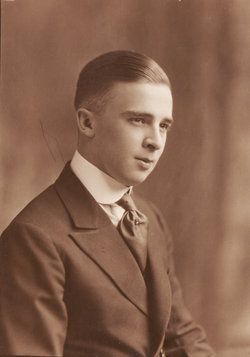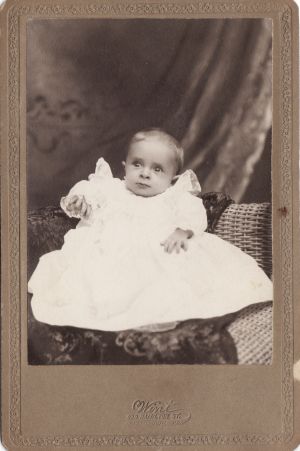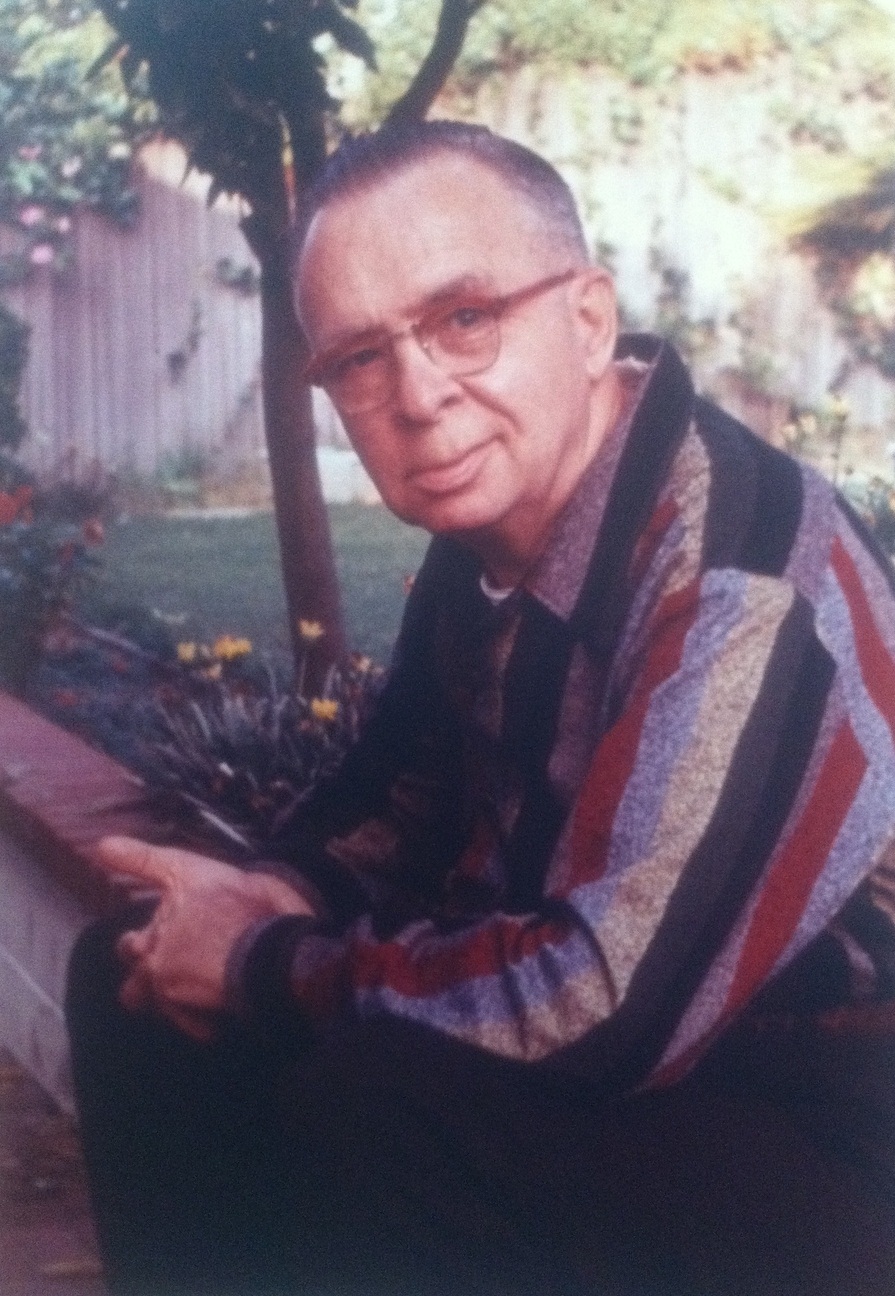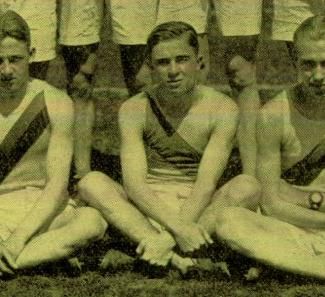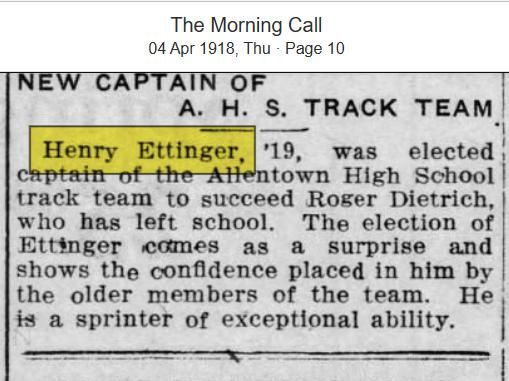He was the husband of Melva Ellen (Helfrich) Ettinger, marrying June 6, 1923 at Grace Evangelical Congregational Church, the vows performed by the Rev. Norman N. Lower. Together they became parents to Ruth (Ettinger) Duncan, Lucille May (Ettinger) Romberger, Edwin H Ettinger, Jane Louise (Ettinger) Hunt.
He suffered from strokes, and died post-surgery, making it through the operation itself just fine, but dying a day or two later, perhaps from a larger stroke from the stress or from the anesthesia. It puzzled everyone, including his own very good physician, the notable vascular surgeon Dr. Harry A. Kaupp Jr. who was troubled by my grandpa's death and who asked for an autopsy to learn why he died. My mom does not recall its outcome. The whole family liked Dr. Kaupp and could tell his concern was genuine. Dr Kaupp also operated on my grandma when the circulation in her legs was failing. But, back to my grandpa.
It's very clear I never really knew my grandpa. When I hear stories about him from my mom and other family members, it's obvious he was a very different man before he had his strokes. I knew him only afterwards, when who he had been became somehow blunted or muted.
As a young man who grew up with two brothers, he was known as an athlete, a runner. In October of 2012, while moving, I came across a silver loving cup trophy enscribed "Pittston Athletic Club, 1 Mile Relay, 1923" - he was not a resident there, but his wife's family was from the area, so likely he participated there once or twice. Despite his family's affiliation with Evangelicals, he liked his liquor, which could be a source of friction with his wife. As long as his health permitted it, he was active with his father and his brothers in the family business C. H. Ettinger and Sons which did plumbing and heating.
My grandpa was tight with his Uncle Ed, his father's brother who was also in the business. Ed had no kids, so perhaps my grandpa was as close as Ed would come to having a son. Like my grandpa, I am told Ed was blunt and sort of plain spoken, liked his liquor, and supposedly the uncle and nephew would play cards together. Their chumminess was capped by Ed's ultimately giving my grandpa his old home at a very sweet price so my grandpa could raise my mom and her three siblings there in a big three story, five bedroom row home. My grandpa returned the favor by naming his only son after Ed.
My mom was my grandpa's favorite kid, probably because of the four, she was the most athletic. Not as forward or assertive as him, and certainly not as free with drink as he was, she was nevertheless forthcoming, strong, and single-minded. Despite their similarities, she found him discomfiting while she was growing up, recalling going home from social visits when her daddy had had too much to drink. The kids would cower in the back seat, he'd be driving, and his wife (who never learned to drive) would be pleading with him to slow down and pay attention.
Sometime after 1950, my grandpa had a stroke, and it must have been a big one, as it affected him greatly. The one side of his face sagged, his speech became thick and difficult to understand, his walk became a shuffling gait, and his hands didn't operate right. From what I'm told, the stroke also affected his essential nature, in that he became softer, less hard-headed.
He did not lose himself completely though. His doctor allowed him one drink daily, so each evening at the appointed hour he would bellow "Bi-ball!" which, despite its sound, was not a request for the religious text, but a demand for his nightly highball.
It must have been hard for such a formerly vital man to find himself so limited and dependent. He and my grandma worked things out in daily tasks. She'd help him dress, and would shave the tricky parts with the electric razor, and he'd do the rest. He would do short walking errands to the store, or go visit his cousin Justine Bechtel.
Perhaps the biggest curse of strokes like his is that they leave the sufferer speaking somewhat unemphatically and moronically- deep, flat, slow and kind of dopey -suggesting the mind too is slow and dopey. People who didn't know him, and kids like me could easily assume he was not capable of much rational thought. It must be maddening to wonder what others think of you when your mind is fine, but your voice makes it sound otherwise.
It's too bad we grandkids can know our grandparents only in their later years. My childhood view of him was sadly a dim one. He wasn't fun, he wasn't interested in doing anything, he didn't converse with me, and I found him frankly a little scary. He was a presence who watched TV and smoked, often until the filter was reeking, or the butt was near burning his fingers, or the wooden arm of the chair he sat in. Then it would get deposited into one of those pedestal ashtrays where you'd hit the top, and the bottom tray would spin open, taking the butt down into a chamber, and then spin closed again to trap any remaining smoke. He spoke loudly and oddly, and was prone to outbursts. He asserted himself in small ways which made him seem like a child needing to be pacified. He would erupt, be served, and then disappear back into silence. Between him and me, my grandma must have been hopping when I came to visit, to get Henry what he needed and then get back to me, the kid who could get into anything.
He didn't seem to ask for much, but when he did, by God, he wanted it now. If what I saw was the softened version of his former self, then I tremble to think what he must have been like when his health had not yet betrayed him. He must have been a force to be reckoned with, as a husband, a dad, or in business.
When your life gets limited, you find ways to assert yourself. One funny thing I remember is that he and my grandma had an ongoing battle over the thermostat. She'd be out in the kitchen cooking, and warm from the stove and work. He was always cold and wore full-sleeve (often flannel) shirts with a cardigan sweater on top. He would rise as quietly as possible from his reclining chair in the living room, which was no mean feat because the leg-part would mechanically contract and snap shut loudly if not carefully controlled. He would shuffle softly out to the hall, and crank the thermostat way up. Some time not much later, my grandma would come flying from the kitchen into the hall, fanning her face with her hands, and holler "Henry!" and turn it back down. If it went much further, I'd hear one of my grandpa's few curses, "Dod-dammit!"
I do not well remember his end, as it came pretty swiftly and unexpectedly. My Aunt Ruth had come down to Allentown to be with my grandma during this time. My grandpa had had gall bladder surgery, and seemed to be doing reasonably well. Then came a call saying they should get to the hospital right away. My mom came and picked them up, and rushed to Allentown Hospital, blowing a light to get there. She dropped them at the door, went to find parking, and by the time she got up there, he had passed away.
And so I think back to how he would bid adieu. You'd have all your stuff packed up, and be ready to leave. In his strange voice, like that of a deaf person who can speak, he'd place the accent on a different syllable making it sound extra-sad, and say "BOOD-bye".
He was the husband of Melva Ellen (Helfrich) Ettinger, marrying June 6, 1923 at Grace Evangelical Congregational Church, the vows performed by the Rev. Norman N. Lower. Together they became parents to Ruth (Ettinger) Duncan, Lucille May (Ettinger) Romberger, Edwin H Ettinger, Jane Louise (Ettinger) Hunt.
He suffered from strokes, and died post-surgery, making it through the operation itself just fine, but dying a day or two later, perhaps from a larger stroke from the stress or from the anesthesia. It puzzled everyone, including his own very good physician, the notable vascular surgeon Dr. Harry A. Kaupp Jr. who was troubled by my grandpa's death and who asked for an autopsy to learn why he died. My mom does not recall its outcome. The whole family liked Dr. Kaupp and could tell his concern was genuine. Dr Kaupp also operated on my grandma when the circulation in her legs was failing. But, back to my grandpa.
It's very clear I never really knew my grandpa. When I hear stories about him from my mom and other family members, it's obvious he was a very different man before he had his strokes. I knew him only afterwards, when who he had been became somehow blunted or muted.
As a young man who grew up with two brothers, he was known as an athlete, a runner. In October of 2012, while moving, I came across a silver loving cup trophy enscribed "Pittston Athletic Club, 1 Mile Relay, 1923" - he was not a resident there, but his wife's family was from the area, so likely he participated there once or twice. Despite his family's affiliation with Evangelicals, he liked his liquor, which could be a source of friction with his wife. As long as his health permitted it, he was active with his father and his brothers in the family business C. H. Ettinger and Sons which did plumbing and heating.
My grandpa was tight with his Uncle Ed, his father's brother who was also in the business. Ed had no kids, so perhaps my grandpa was as close as Ed would come to having a son. Like my grandpa, I am told Ed was blunt and sort of plain spoken, liked his liquor, and supposedly the uncle and nephew would play cards together. Their chumminess was capped by Ed's ultimately giving my grandpa his old home at a very sweet price so my grandpa could raise my mom and her three siblings there in a big three story, five bedroom row home. My grandpa returned the favor by naming his only son after Ed.
My mom was my grandpa's favorite kid, probably because of the four, she was the most athletic. Not as forward or assertive as him, and certainly not as free with drink as he was, she was nevertheless forthcoming, strong, and single-minded. Despite their similarities, she found him discomfiting while she was growing up, recalling going home from social visits when her daddy had had too much to drink. The kids would cower in the back seat, he'd be driving, and his wife (who never learned to drive) would be pleading with him to slow down and pay attention.
Sometime after 1950, my grandpa had a stroke, and it must have been a big one, as it affected him greatly. The one side of his face sagged, his speech became thick and difficult to understand, his walk became a shuffling gait, and his hands didn't operate right. From what I'm told, the stroke also affected his essential nature, in that he became softer, less hard-headed.
He did not lose himself completely though. His doctor allowed him one drink daily, so each evening at the appointed hour he would bellow "Bi-ball!" which, despite its sound, was not a request for the religious text, but a demand for his nightly highball.
It must have been hard for such a formerly vital man to find himself so limited and dependent. He and my grandma worked things out in daily tasks. She'd help him dress, and would shave the tricky parts with the electric razor, and he'd do the rest. He would do short walking errands to the store, or go visit his cousin Justine Bechtel.
Perhaps the biggest curse of strokes like his is that they leave the sufferer speaking somewhat unemphatically and moronically- deep, flat, slow and kind of dopey -suggesting the mind too is slow and dopey. People who didn't know him, and kids like me could easily assume he was not capable of much rational thought. It must be maddening to wonder what others think of you when your mind is fine, but your voice makes it sound otherwise.
It's too bad we grandkids can know our grandparents only in their later years. My childhood view of him was sadly a dim one. He wasn't fun, he wasn't interested in doing anything, he didn't converse with me, and I found him frankly a little scary. He was a presence who watched TV and smoked, often until the filter was reeking, or the butt was near burning his fingers, or the wooden arm of the chair he sat in. Then it would get deposited into one of those pedestal ashtrays where you'd hit the top, and the bottom tray would spin open, taking the butt down into a chamber, and then spin closed again to trap any remaining smoke. He spoke loudly and oddly, and was prone to outbursts. He asserted himself in small ways which made him seem like a child needing to be pacified. He would erupt, be served, and then disappear back into silence. Between him and me, my grandma must have been hopping when I came to visit, to get Henry what he needed and then get back to me, the kid who could get into anything.
He didn't seem to ask for much, but when he did, by God, he wanted it now. If what I saw was the softened version of his former self, then I tremble to think what he must have been like when his health had not yet betrayed him. He must have been a force to be reckoned with, as a husband, a dad, or in business.
When your life gets limited, you find ways to assert yourself. One funny thing I remember is that he and my grandma had an ongoing battle over the thermostat. She'd be out in the kitchen cooking, and warm from the stove and work. He was always cold and wore full-sleeve (often flannel) shirts with a cardigan sweater on top. He would rise as quietly as possible from his reclining chair in the living room, which was no mean feat because the leg-part would mechanically contract and snap shut loudly if not carefully controlled. He would shuffle softly out to the hall, and crank the thermostat way up. Some time not much later, my grandma would come flying from the kitchen into the hall, fanning her face with her hands, and holler "Henry!" and turn it back down. If it went much further, I'd hear one of my grandpa's few curses, "Dod-dammit!"
I do not well remember his end, as it came pretty swiftly and unexpectedly. My Aunt Ruth had come down to Allentown to be with my grandma during this time. My grandpa had had gall bladder surgery, and seemed to be doing reasonably well. Then came a call saying they should get to the hospital right away. My mom came and picked them up, and rushed to Allentown Hospital, blowing a light to get there. She dropped them at the door, went to find parking, and by the time she got up there, he had passed away.
And so I think back to how he would bid adieu. You'd have all your stuff packed up, and be ready to leave. In his strange voice, like that of a deaf person who can speak, he'd place the accent on a different syllable making it sound extra-sad, and say "BOOD-bye".
